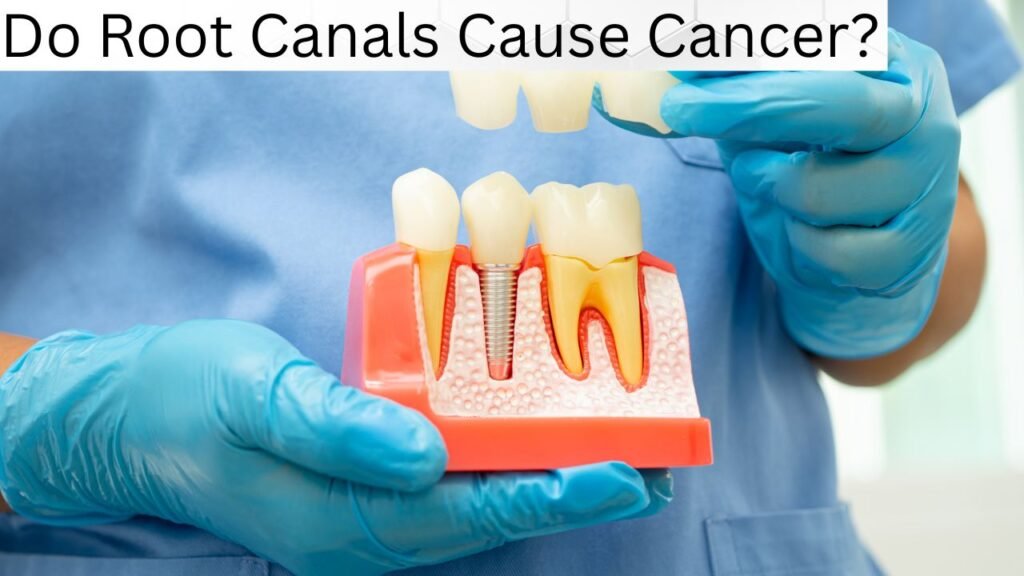If you’ve been wondering, do root canals cause cancer? — the short answer is no, they do not. This myth has been circulating for years, causing unnecessary fear and confusion. But, decades of scientific research confirm that root canal procedures are safe.
In this post, we’ll dive into the origins of the myth, the science that debunks it, and why you can confidently trust your dentist when it comes to root canal treatment.

Key Takeaways
- No link between root canals and cancer.
- The myth originated from outdated research.
- Scientific evidence from credible organizations like the ADA and NCI confirms the safety of root canals.
- Root canals are localized treatments, meaning they cannot spread cancer.
- Modern techniques ensure that there are no “trapped toxins” after the procedure.
Where Did the Root Canal-Cancer Myth Originate?
The myth of root canals causing cancer can be traced back to the early 20th century, primarily to the work of Dr. Weston A. Price. Dr. Price was a dentist who theorized that bacteria in root canal-treated teeth could lead to systemic diseases, including cancer.
However, modern science has debunked this theory. Dr. Price’s research lacked control groups, used outdated sterilization methods, and has never been replicated using modern standards. Despite this, his findings have continued to circulate on alternative health websites and social media, fueling this fear.
Scientific Evidence: Root Canals and Cancer
Many people ask, “Is there a link between root canal and cancer?” The answer, once again, is no.
Leading organizations such as the American Dental Association (ADA) and the National Cancer Institute (NCI) have conducted thorough reviews of the research and found no scientific evidence supporting the claim that root canals cause cancer. Their conclusions are based on large-scale epidemiological studies, systematic reviews of research, and decades of clinical practice.
In fact, the 2013 study published in the Journal of the American Medical Association (JAMA) Oncology found no increased cancer risk among individuals who had root canal treatment. This study was based on 46,000 participants, controlled for other risk factors, and showed no statistical association between root canals and cancer.
Why Root Canals Can’t Cause Cancer: The Biological Reality
So, why is it biologically implausible for a properly performed root canal to cause cancer? Let’s break it down.
- Localized Treatment: Root canals are confined to the infected tooth, which is isolated from the rest of the body. Once the infected tissue is removed, the root canal is sealed with a biocompatible material, ensuring there’s no risk of infection spreading.
- Sterilization Techniques: Today’s sterilization methods are far superior to what was available a century ago. Bacteria are carefully eliminated during the procedure, and the tooth is sealed tight.
- Immune System Response: If any bacteria were left behind, your body’s natural immune system would handle it. The area is localized, and your immune system can manage minor bacterial presence without it turning into a serious infection or cancer.
In essence, root canals do not release toxins into the body. They prevent further infection from spreading, and there’s no mechanism by which a properly sealed root canal could contribute to systemic illness, let alone cancer.
Debunking the “Trapped Toxins” Myth
A common myth surrounding root canals is that they “trap toxins” inside the body, leading to chronic illness or even cancer. But this idea is biologically incorrect.
Here’s why:
- Teeth and Bacteria: All teeth naturally contain microscopic tubules, but this does not mean they are “infected” in a harmful way.
- Modern Cleaning Methods: During root canal treatment, advanced instruments and solutions are used to clean out the infected tissue, sterilize the area, and prevent bacteria from thriving.
- No Toxin Release: Once sealed, a root canal-treated tooth cannot release toxins into your system, even if small amounts of bacteria are still present.
If your dentist recommends a root canal, it’s because the treatment is the safest option to save the tooth and prevent infection from spreading further.
What Dentists and Oncologists Say Today
Both dentists and oncologists agree that root canals do not increase the risk of cancer. The ADA emphasizes that there is no valid, scientific evidence linking root canal treatment to cancer or other systemic diseases.
The National Cancer Institute (NCI) also clearly states that there is no connection between root canals and cancer, further supporting the consensus among medical professionals.
In fact, ignoring necessary dental treatment, like a root canal, could lead to serious health problems that might require more invasive and expensive procedures. It’s always best to follow your dentist’s advice and not let myths hold you back.
The Real Risks: Poor Oral Hygiene and Cancer
While root canals are safe, there’s actually stronger evidence linking poor oral hygiene and untreated gum disease to certain types of cancer. Poor oral health can lead to chronic inflammation in the gums, which may increase the risk of cancers like throat or pancreatic cancer.
So, while root canals are safe and necessary, maintaining good oral hygiene is critical to overall health and can help reduce the risk of other health issues, including cancer.
conclusion:
To sum it up: root canals do not cause cancer. The myth started with outdated research and has been debunked by decades of modern, scientific studies. Root canal procedures are safe, effective, and crucial in preventing further infection and saving your teeth.
If you’re still unsure, talk to your dentist. They can address your concerns and provide you with trustworthy, evidence-based information to help you make the best decision for your health.
Find Your Perfect Dentist
Easily book appointments with top-rated dentists in your area
Need Emergency Dental Care?
Get immediate help from verified dental professionals